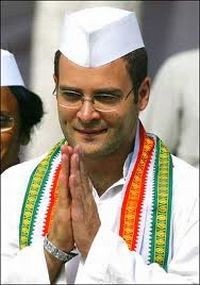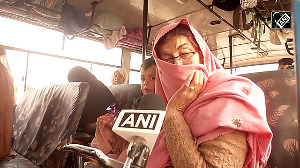 India is being fed on false homilies by those who have been either elected or appointed to be guardians of the Constitution and public faith. The shameful ordinance episode should be reviewed objectively in Parliament and outside by the intelligentsia -- and appropriate correctives applied, says C Uday Bhaskar.
India is being fed on false homilies by those who have been either elected or appointed to be guardians of the Constitution and public faith. The shameful ordinance episode should be reviewed objectively in Parliament and outside by the intelligentsia -- and appropriate correctives applied, says C Uday Bhaskar.
October 2, celebrated as Gandhi Jayanti to venerate the Mahatma Gandhi (born 1869) and his extraordinary life, witnessed a gigantic travesty this year. Five days after Congress vice president Rahul Gandhi dramatically rubbished the ordinance regarding convicted legislators, the Union cabinet headed by Prime Minister Manmohan Singh convened a meeting on that day to withdraw the controversial ordinance.
The meeting was very brief -- under 20 minutes -- and it was announced that the cabinet had ‘unanimously’ decided to withdraw not just the ordinance that had been sent to the President but also the bill that sought to amend the Representation of the People Act, from which the former was derived.
In the frenzied media debates that followed on television, Congress spokespersons sought to take credit and project the decision as a major triumph that had been arrived at on Gandhi Jayanti -- and that this symbolised the determination of the United Progressive Alliance government to deal with corruption in public life. The sub-text was that Bapu would have been proud of this development -- notwithstanding the bizarre sequence of events that had senior ministers and spokespersons defending the ordinance vehemently for days on end -- and then suddenly doing a U-turn as soon as Rahul Gandhi had rolled up his sleeves and uttered the word ‘nonsense’ twice.
Many aspects of this unsavory incident have been examined and the consensus is that while the nation is indeed relieved that such an indefensible ordinance had been struck down -- the peremptory manner in which this was done by the Congress vice president was in poor taste and did not augur well for propriety and procedural rectitude.
But this apart, two other strands of the ordinance fracas merit objective review. One is the dilution and seeming abdication of institutional integrity and constitutional responsibility by the guardians; and two -- the cumulative impact of such developments on long term national security.
The manner in which the ordinance sought to trump the Supreme Court judgment disqualifying convicted legislators has raised both legal and constitutional eyebrows and caused deep dismay among the intelligentsia, for it appeared to be a crass display of executive authority vested in the cabinet.
The fact that the core of this ordinance was at variance with the Supreme Court judgment and that it violated the spirit of the Constitution by providing protection to convicted legislators was something that could not have escaped the attention of the parliamentarians in the UPA coalition, as also the cabinet. Yet they allowed this to be approved and sent to the President. The relevance of this ordinance for the political future of Rashtriya Janata Dal leader Lalu Yadav convicted for the scandalous fodder scam was there for all to see.
Regrettably the opposition parties also allowed themselves to be co-opted in this ordinance fiasco and objections voiced were opaque and muted. Luckily for the nation, President Pranab Mukherjee was able to advise caution. The Rahul Gandhi bombshell followed and ‘ordinance is nonsense’ became the mantra for the Congress and its luminaries.
The blame game began in earnest and within minutes of the Rahul denunciation, some cabinet ministers and senior Congress leaders suddenly found that they had a conscience and deep reservations about the import of the said ordinance. Party discipline and cabinet protocol, they averred, had not allowed them to voice their opinions earlier.
The opposition also put up an earnest defence and made out a holier-than-thou case about their rejection of the ordinance that briefly dominated the audio-visual medium. More shame was in store when the Parliamentary Affairs Minister Kamal Nath alleged that the Bharatiya Janata Party had actually agreed to help pass the controversial bill and that they were covering their tracks. Minutes of a meeting soon found their way to some media outlets.
Immediately the BJP questioned the authenticity of the ‘so-called minutes’ and for the average Indian -- this was anguishing. Who is one to believe? Fidelity to truth and fact, so dear to Gandhiji were being flouted by India’s elected representatives -- for good measure on October 2.
The questions that arise are the following and one hopes that the answers will be placed in the public domain -- not because of an RTI by a concerned citizen -- but because the guardians of our institutions feel a sense of responsibility that the truth, however sordid, must prevail.
What were the observations of the Congress-led coalition in the first instance that advocated the ordinance route to blunt a Supreme Court judgment that placed fetters on convicted legislators? Why did the august cabinet recommend this ordinance option, even while being cognisant that this was to be used only in a rare exigency? Did any UPA legislator or a cabinet member draw attention to the negative impact that this ordinance would have on internal security?
And if none of these worthies voiced any view or reservation about these aspects, did any of the other constitutional appointees or senior officials mandated to advise the political executive place on record their misgivings about the implications of this ordinance? If they did, it would be a faint silver lining to a very dark cloud that hovers over India.
The average Indian citizen has borne the brunt of the ugly muscle power of many elected representatives and the criminalisation of politics and the steady politicisation of crime. This is evidenced in the fact that in many states, home ministers control the posting of policemen. In the last decade plus, both Bihar and UP have been differently described as ‘goonda-raj’ and ‘mafia-pradesh’.
Like the emperor’s new clothes, India is being fed on false homilies by those who have been either elected or appointed to be guardians of the Constitution and public faith. The shameful ordinance episode should be reviewed objectively in Parliament and outside by the intelligentsia -- and appropriate correctives applied.
It merits recall that Gandhiji had listed the practice of politics without principle as a cardinal sin. This was published in Young India on October 22, 1925. Perhaps the next session of Parliament could reflect on this truism and ponder over how deviant and sullied the current political ethos in India has become.










